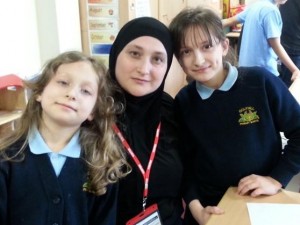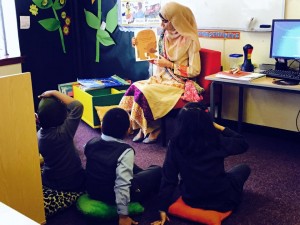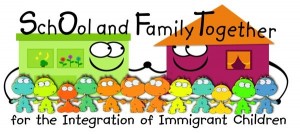
The most important reason to promote parental involvement in their children’s education is because it helps children to thrive. We have been speaking to parents, teachers and other professionals who all recognise the huge impact that having parents working with the school as part of the school community makes to the children. As one teacher said “confident individuals, guaranteed!”
However we haven’t done much work listening to the children’s point of view. As part of the film we made with the wonderful students from City of Glasgow College’s television department we wanted to speak to children and hear their voices too. We were lucky enough to be able to speak to two groups of children from Golfhill Primary and St Albert’s Primary. I think we found some future film stars and got some lovely footage of the children’s faces lighting up when they talked about how their parents got involved.
 Golfhill Learning Together Club
Golfhill Learning Together Club
In Golfhill children from the Learning Together club (run by the EAL teacher Marilyn Gordon- see http://gatheredtogether.bemis.org.uk/?p=663) spoke about how they felt about their parents coming in to school. One young boy, whose older brother attends the group told us about a time when they acted out a play with puppets and then he and his brother read a story together “and the class stopped but I wanted to go on reading forever”. My favourite moment was when a girl was asked how she felt when her mum came into school said “I feel GENIUS!” (a word she had just learned in learning club).
The children we interviewed at St Albert’s were a mix of children whose parents were in the Parent Council, came to St Albert’s learning club or were involved in the bilingual story telling (to see some of the mothers from the story telling group go to http://gatheredtogether.bemis.org.uk/?p=854). The children spoke about feeling proud that their parents and that it showed them their parents cared and took an interest in them.
 Sadia reading to children at St Albert’s
Sadia reading to children at St Albert’s
It was great to be able to capture the positive stories and experience of children but we know that this isn’t the case for every child. After speaking to parents with the Rainbow Muslim Women’s group, who had some difficult experiences getting involved in their children’s education (go to http://gatheredtogether.bemis.org.uk/?p=878 to see Samina and Tasneem talking about their experiences). They suggested that we could also speak to children from within the Rainbow women’s group and we met with Niem and Nailah to hear their story.
Nailah said that she felt quite uncomfortable about her mother coming into school because English wasn’t her first language and she was worried what the teachers would think. She also talked about not wanting her parents to be involved and throwing letters from school in the bin. It can be really difficult for families who are new to Scotland (and parents who are new to English) to become involved in the school community and the dynamics between children and their parents can change because of the language barrier. Niem, Nailah’s younger brother, spoke about the difference that it made when his parents became involved after he was being bullied at school. He felt that the teachers listened to his parents more and also that when they do get involved it showed that they cared about him and how he was getting on at school. We made a podcast of their conversation- to hear Nailah and Niem just go to http://gatheredtogether.bemis.org.uk/?p=878
Yesterday I attended an event at Strathclyde University reporting back on the finding from “Roma families’ engagement with education and other services in Glasgow” by Dr Sime and Dr Fassetta. It looked at the experiences of Roma families who have moved to Glasgow and the services that support them. (If you are interested we recommend reading the full report- http://tinyurl.com/ppalqwr).
The report interviewed teachers and parents and gave some valuable insights into what it is like for the new families moving into Glasgow and the positive role that schools have in welcoming them. Within the small area of Govanhill where the majority of the Roma families have settled the schools have become the first point of information for families, going far beyond their duties to helping families with benefit claims and services. While Govanhill has been very stretched by the levels of immigration, the schools have taken the opportunity to build links with the local community to work together to help the families.
Roma families have often had very negative experiences of schools in their home countries, including high levels of discrimination. This has meant that they often have difficulties trusting school. We head from Wendy English, Principal teacher at Annette Street primary about the concerns that parents had around school trips- including anxiety that their children would be taken away. This meant that parents would keep children off school on the day of the trip and children missed out on valuable learning experiences. To address this the Roma children and families department arranged an opportunity for the parents to visit the Kelvingrove Art Gallery before the trip, this gave them the chance to see where their children would go, reassure them that it was safe and to visit another part of the city. Working creatively with other organisations including housing associations, the local Big Noise children’s music group, health services and social work has helped the schools to meet the needs in a joined up way.
The report also highlighted the cultural differences that schools and education services need to deal with. The Roma families are generally very close and children are constantly with their parents. It has been a struggle to get Roma families to take their children to nursery. One mother said
Who else can look after my baby better than me? Send him to nursery, when he needs to sleep in the afternoon, and he needs his mother if he falls over or something.
The schools have been working with the families to develop that trust, including telling parents that when their children at school the teachers were their mothers, using the language of families to reassure parents. Understanding the values of the community the pupils come from is central to being able to engage with parents and it was great to see so many teachers from the schools within Govanhill at the event eager to learn more about the lives and experiences of the Roma families.
While there are huge challenges to engaging with migrant families the schools have some brilliant good practice- particularly in working in partnership with local services and the staff commitment to truly understanding and respecting the cultural backgrounds that their children come from.
We are working with a lot of organisations, sharing our experiences and looking for ways we can work together to support Ethnic Minority families become part of their school communities. Martha from SOFT has kindly written us a guest blog about the work that they are doing to help immigrant families

The SOFT project aims to foster the linguistic and social integration of migrant children through shared language learning activities that involve teachers, families and children.
SOFT- is a language project funded by the European Union EACEA/Lifelong Learning Programme and involves several countries (Spain, Germany, Switzerland, Scotland and Italy). There are currently 6 schools and nurseries taking part in Edinburgh, involving 576 children and 29 teachers. The schools involved in our city are: Fort Early Learning Centre, St Mary’s RC Primary, Castleview, Niddrie Mill, St David’s and Tollcross Primaries.
The Language activities are based on the Narrative Format approach of language learning, also known as the “Hocus & Lotus” method used previously in several EU projects. Children learn languages through telling stories, whilst acting them out, singing or drawing. The most important aim of this project is to raise awareness of the advantages of early language learning in benefiting cognitive and literacy development, and it is also a fun activity to do in the class with friends and feel valued. This fosters positive attitudes towards intercultural communication and multilingualism, facilitates the use of cooperative and collaborative learning practices in class and enhances home-school relationships.
For more information visit their website http://www.softintegration.eu/index.php/en/soft-project or http://www.bilingualism-matters.ppls.ed.ac.uk/projects/soft-2/